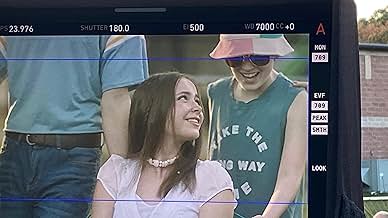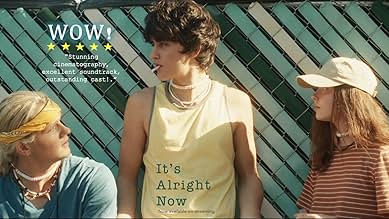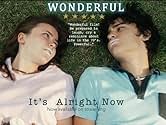Añade un argumento en tu idioma'It's Alright Now' tells the story of how a childhood accident in 1968 changes the lives of three kids forever and creates an inseparable bond.'It's Alright Now' tells the story of how a childhood accident in 1968 changes the lives of three kids forever and creates an inseparable bond.'It's Alright Now' tells the story of how a childhood accident in 1968 changes the lives of three kids forever and creates an inseparable bond.
Argumento
Reseña destacada
An early image in "It's Alright Now" has a young, seemingly healthy and robust young teenage boy lounging in the sun. It's only a moment or two later when we see his two friends help glide him down a Slip-N-Slide that we realize this young man is unable to move from the waist down. This makes for an appropriate, almost-allegorical preface for the events to come in Karee Von's captivating indie drama about a teenage girl on the cusp of adulthood, who is desperately searching for surface-level elements to mask her own damaged interior.
While set against the backdrop of an unspecified summer in the 1970's, Von's picture is decidedly less fixated on the 70's cultural landscape and more invested in the universal growing pains associated with coming of age in small town America.
At the heart of the story is playful teenage protagonist, Ann whose bond with her childhood friends, paraplegic cousin, Brian and quirky neighborhood pal, Patrick, proves a comforting escape from her increasingly fractured home life. Her father has left town, her relationship with her older sister is strained, and her mother is currently tied down in a dependent relationship with a mentally unstable character who is adding fuel to an already fiery predicament.
Away from her dysfunctional home surroundings, Ann tries to make the most out of her time with her tight-knit circle of friends. The trio have that kind of isolated, outcast chemistry that works well in smaller, more personal films such as these. There's a bittersweet contrast between the livelier scenes of Ann and her friends enjoying their care-free summer days out by the baseball diamond and the more uncomfortable ones showcasing Ann's struggles at home.
The decision to position the events of "Alright Now" through the evocative narrative filter of the 70's makes for an interesting if formidable endeavor. Attempting to capture a period-authentic feel, close to fifty years removed from the timeline of the story would seem an ambitious challenge for just about any film. Doing so on a seemingly limited budget requires an even further level of artistic bravery that few filmmakers tend to embrace and even fewer, execute successfully. On that alone, Von's work on this film is nothing short of admirable. But admiration for an artist's efforts by itself does not necessarily equate to an entertaining final product.
Smaller, independent films like these always seem to have their work cut out for them when it comes to getting noticed in an already congested marketplace and in the rare chance where they do get noticed, they are often unfairly judged against much larger studio pictures with infinitely more resources. The indie community from which these films come from, tends to sell them up, which often creates a boomerang effect of attracting more discriminating viewers who rate them ridiculously low based on inflated expectations. In turn, that prototypical "undecided viewer" is left trying to gage their interest in the film through an inconsistent bubble of mixed reviews.
In reviewing films, I think it important to understand that all films aren't for everyone. A pitfall a lot of hobbyist critics/angry consumers fall into is judging a product's merits based on the product wanted, instead of the product they got. This is a particularly slippery slope when it comes to analyzing something as subjective as art. For example, those expecting this film to indulge in a more retro-leaning presentation might subtract points for how it delivers on that but in doing so, I think they risk missing a significant part of the overall experience. From my perspective, I viewed this picture as far less interested in recapturing the aesthetic of the 70's as it was in presenting those forgotten truths, warts and all, that come with growing up in any era.
So just who would be the audience for this kind of film? I feel it is most likely to be favored by those who enjoy more grounded films of emotional growth like Allsion Anders' Gas, Food, and Lodging or Lori Petty's The Poker House. The more nostalgia-based production values present in say, Dazed and Confused or the more recent Licorice Pizza, are all but absent here but thankfully, Von chooses her resources wisely and allows the storytelling and performances to be the selling point.
The performances in "Alright Now" are in my opinion, its greatest strength, particularly with regards to its lead. I can only imagine coming-of-age roles being a real pain in the backside to cast. They require a young actor who can not only deliver what is on the page but also has the ability to believably present both naivete and maturity in a single performance. In that regard, Von seems to have hit pay dirt with the casting of Amber Rothberg as Ann. At first glance, Rothberg appears an exceptionally promising performer, blessed with a talent for being able to convey a lot through expression. You can often gage the emotional temperature of a scene through how she plays it. No easy feat. As one should hope for in anyone inhabiting a lead role, she mixes well with nearly everyone she shares the screen with. Her big emotional highlight being in the midst of a hostile confrontation with her mom's erratic and belligerent boyfriend.
Story-wise, you have likely seen many of the events that unfold in "Alright Now" in other movies with varying results. I don't consider this a strike against it. Slice-of-life films tend to be less about the idea on paper and more about how it is executed on the screen. I dug how the film went about itself in this regard. I cared about the characters and was invested in what happened to them until the very end. Even the noticeably flawed characters like Ann's mother and sister behave in a way that is believable given the circumstances of their surroundings, their desperation and urgency feel earned rather than manufactured, a credit to both the actors and the material.
I don't consider It's Alright Now a great movie but it is a really good one. It gets a lot right and in those rare instances, where I thought it missed its mark a little bit, it never did so in a way that turned me off. There are the expected creative "blisters" here and there that come with low-budget filmmaking but even that rawness brings with it a certain endearing charm. From a filmmaking standpoint, I think this movie would make a worthwhile one to study for anyone trying to create a period-based film on a budget. Rather than sprinkle this film with the kind of hyperbole that tends to cannonball smaller independent films, I'll keep it simple. It's not a once-in-a-lifetime event movie but I enjoyed it a great deal and hope more people go out of their way to see it.
While set against the backdrop of an unspecified summer in the 1970's, Von's picture is decidedly less fixated on the 70's cultural landscape and more invested in the universal growing pains associated with coming of age in small town America.
At the heart of the story is playful teenage protagonist, Ann whose bond with her childhood friends, paraplegic cousin, Brian and quirky neighborhood pal, Patrick, proves a comforting escape from her increasingly fractured home life. Her father has left town, her relationship with her older sister is strained, and her mother is currently tied down in a dependent relationship with a mentally unstable character who is adding fuel to an already fiery predicament.
Away from her dysfunctional home surroundings, Ann tries to make the most out of her time with her tight-knit circle of friends. The trio have that kind of isolated, outcast chemistry that works well in smaller, more personal films such as these. There's a bittersweet contrast between the livelier scenes of Ann and her friends enjoying their care-free summer days out by the baseball diamond and the more uncomfortable ones showcasing Ann's struggles at home.
The decision to position the events of "Alright Now" through the evocative narrative filter of the 70's makes for an interesting if formidable endeavor. Attempting to capture a period-authentic feel, close to fifty years removed from the timeline of the story would seem an ambitious challenge for just about any film. Doing so on a seemingly limited budget requires an even further level of artistic bravery that few filmmakers tend to embrace and even fewer, execute successfully. On that alone, Von's work on this film is nothing short of admirable. But admiration for an artist's efforts by itself does not necessarily equate to an entertaining final product.
Smaller, independent films like these always seem to have their work cut out for them when it comes to getting noticed in an already congested marketplace and in the rare chance where they do get noticed, they are often unfairly judged against much larger studio pictures with infinitely more resources. The indie community from which these films come from, tends to sell them up, which often creates a boomerang effect of attracting more discriminating viewers who rate them ridiculously low based on inflated expectations. In turn, that prototypical "undecided viewer" is left trying to gage their interest in the film through an inconsistent bubble of mixed reviews.
In reviewing films, I think it important to understand that all films aren't for everyone. A pitfall a lot of hobbyist critics/angry consumers fall into is judging a product's merits based on the product wanted, instead of the product they got. This is a particularly slippery slope when it comes to analyzing something as subjective as art. For example, those expecting this film to indulge in a more retro-leaning presentation might subtract points for how it delivers on that but in doing so, I think they risk missing a significant part of the overall experience. From my perspective, I viewed this picture as far less interested in recapturing the aesthetic of the 70's as it was in presenting those forgotten truths, warts and all, that come with growing up in any era.
So just who would be the audience for this kind of film? I feel it is most likely to be favored by those who enjoy more grounded films of emotional growth like Allsion Anders' Gas, Food, and Lodging or Lori Petty's The Poker House. The more nostalgia-based production values present in say, Dazed and Confused or the more recent Licorice Pizza, are all but absent here but thankfully, Von chooses her resources wisely and allows the storytelling and performances to be the selling point.
The performances in "Alright Now" are in my opinion, its greatest strength, particularly with regards to its lead. I can only imagine coming-of-age roles being a real pain in the backside to cast. They require a young actor who can not only deliver what is on the page but also has the ability to believably present both naivete and maturity in a single performance. In that regard, Von seems to have hit pay dirt with the casting of Amber Rothberg as Ann. At first glance, Rothberg appears an exceptionally promising performer, blessed with a talent for being able to convey a lot through expression. You can often gage the emotional temperature of a scene through how she plays it. No easy feat. As one should hope for in anyone inhabiting a lead role, she mixes well with nearly everyone she shares the screen with. Her big emotional highlight being in the midst of a hostile confrontation with her mom's erratic and belligerent boyfriend.
Story-wise, you have likely seen many of the events that unfold in "Alright Now" in other movies with varying results. I don't consider this a strike against it. Slice-of-life films tend to be less about the idea on paper and more about how it is executed on the screen. I dug how the film went about itself in this regard. I cared about the characters and was invested in what happened to them until the very end. Even the noticeably flawed characters like Ann's mother and sister behave in a way that is believable given the circumstances of their surroundings, their desperation and urgency feel earned rather than manufactured, a credit to both the actors and the material.
I don't consider It's Alright Now a great movie but it is a really good one. It gets a lot right and in those rare instances, where I thought it missed its mark a little bit, it never did so in a way that turned me off. There are the expected creative "blisters" here and there that come with low-budget filmmaking but even that rawness brings with it a certain endearing charm. From a filmmaking standpoint, I think this movie would make a worthwhile one to study for anyone trying to create a period-based film on a budget. Rather than sprinkle this film with the kind of hyperbole that tends to cannonball smaller independent films, I'll keep it simple. It's not a once-in-a-lifetime event movie but I enjoyed it a great deal and hope more people go out of their way to see it.
- CrazyJim2004
- 31 oct 2023
- Enlace permanente
Selecciones populares
Inicia sesión para calificar y añadir a tu lista para recibir recomendaciones personalizadas
- How long is It's Alright Now?Con tecnología de Alexa
Detalles
- Duración1 hora 31 minutos
- Color
Contribuir a esta página
Sugerir un cambio o añadir el contenido que falta

Principal laguna de datos
What is the Spanish language plot outline for It's Alright Now (2023)?
Responde
























